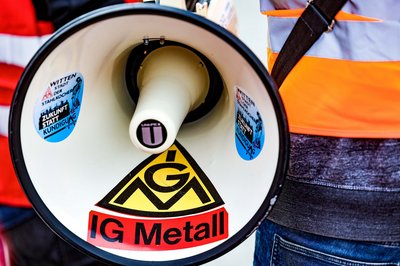
The contracts that ensure fairness in the company
This is only possible with a collective agreement
Where collective agreements apply, things are fairer. But when and to whom do they even apply? What does collective bargaining actually look like? We explain which collective agreements exist, what they regulate and who is "bound by collective agreements".
Not all collective agreements are the same. There are currently a total of 1866 collective agreements in force in the area covered by IG Metall. In the metal and electrical industry alone, 376 of these govern the income and working conditions for more than 2.4 million employees covered by collective agreements.
But which collective agreements regulate what exactly? To whom do they apply and who is bound by the agreements?
What does collective bargaining coverage mean?
Collective bargaining coverage is regulated in Section 3 of the Collective Bargaining Act. Accordingly, an employer who is a member of an employers' association is "bound by collective agreements". And the employee who belongs to a trade union. If both are bound by collective agreements, they are also "bound" by the applicable collective agreements negotiated by the employers' association and the relevant trade union. The employer must pay the agreed collectively agreed wage and grant vacation, Christmas bonuses and other collectively agreed benefits. In return, the employee must perform the work and services for which he or she is paid during the agreed working hours. The employer bound by the collective agreement can only deviate from the collective agreement when paying an employee if, for example, the remuneration is equal to or better than the collectively agreed pay.
However, a collective agreement can also be binding for employers and employees who are not bound by a collective agreement - if it has been declared "generally binding" by the Federal Ministry of Labor (Section 5 of the Collective Agreement Act). Example: In addition to the statutory minimum wage, there are also collective industry minimum wages that are generally binding - for example in temporary work. All employers and employees in the temporary employment sector must adhere to these generally binding collective minimum wages.
Even if the employer voluntarily grants the collectively agreed benefits to all employees, only those employees who are members of the trade union that concluded the agreement are legally entitled to them.
Which collective agreements regulate what?
Area or sectoral, association or sector collective agreements
A sectoral collective agreement exists when IG Metall and the employers' association conclude a collective agreement for an entire sector in a specific region ("area"), for example for the metal and electrical industry in North Rhine-Westphalia. This collective agreement is typical of the collective bargaining landscape in Germany and is also known as an association or sector collective agreement.
The sectoral collective agreement guarantees largely equal competitive conditions for the companies in the individual sectors. It sets minimum standards and protects employees from wage dumping. The regional collective agreement is binding for all employers and employees bound by collective agreements in the respective sector and region. However, they also have an indirect effect on companies that are not bound by collective agreements, for example by referring to the regulated collective agreement standards in employment contracts.
The most important sectoral collective agreements include
Wage, salary and remuneration collective agreements
These collective agreements regulate the level of wages, salaries and training allowances (pay) in the form of pay tables. Their duration is manageable because the remuneration is adjusted in line with economic and productivity developments.
Collective wage agreements (Entgeltrahmentarifverträge (ERA))
From wages and salaries to uniform remuneration: With the framework pay agreements (ERA), IG Metall and the employers' associations created a set of rules in the metal and electrical industry in 2003 that abolished the traditional distinction between blue-collar and white-collar workers and standardized their pay. Workers and salaried employees became employees - remuneration replaced the terms wage and salary. But not only terms were changed. ERA also stands for transparency in the pay structure and greater fairness. This is because pay is based on work and not on "nose bonuses". All employees are assigned to a pay group according to the same rules. This means: equal pay for comparable work tasks in development, production and administration. The framework agreements describe the job characteristics for the individual pay groups and the criteria for the respective classification.
General collective agreements
The genereal collective agreement regulates almost everything to do with working conditions - such as working hours, vacations and vacation pay, time off, bonuses, recruitment and dismissal conditions.
There are also other sectoral collective agreements on individual topics such as special annual payments (Christmas bonus), company pension schemes, partial retirement and training.
Recognition collective agreement
If IG Metall agrees a company collective agreement with a company that is not bound by a collective agreement, in which the employer undertakes to apply the regional collective agreement, this constitutes a recognition collective agreement. The employees have the same collective bargaining rights as regulated in the corresponding regional collective agreement - provided they are union members. Recognition agreements are not deviations from the regional collective agreement.
Company collective agreement
Also known as in-house or company collective agreements. In a company collective agreement, the employer itself is a party to the collective agreement and negotiates it directly with the relevant trade union. The company is not bound by the regional collective agreement and is therefore not a member of an employers' association. Employees are entitled to the benefits set out in the company collective agreement, provided they have a membership card from the trade union concluding the agreement. New collective agreements are also negotiated and agreed directly with the employer. As in sectoral collective agreements, all working and income conditions can be regulated in company collective agreements. The best-known example of a company collective agreement is the works collective agreement with Volkswagen.
Company-related association collective agreements
If, for example, a company bound by a collective agreement is in an economic crisis, it can seek a company-specific collective agreement with the help of a supplementary collective agreement, such as the "Pforzheim" agreement, in order to secure the location and employment. In this case, the employer can have the economic situation examined together with the works council and IG Metall and decide that his company may deviate from the minimum standards set out in the collective agreement for a limited period of time. The agreed regulations supplement the applicable regional collective agreement. The contractual partners are IG Metall and the respective employers' association.
As a general rule, whether it's an area, recognition or company collective agreement - collective agreements are fair agreements and recognize the value of work.
How to get a collective agreement
When looking for a job, it is worthwhile for employees to check whether a company is covered by a collective agreement. If there is no collective agreement in a company, this does not have to be a permanent situation. Active workforces can fight for a collective agreement. You can get advice and help from our offices.

Become part of a strong community. You win by joining the union!
Together we build a strong tomorrow!
Together, we are already over 2.1 million members who work in over 30 industries. There are many of us, and our diversity makes us strong: office workers, engineers and IT specialists belong to IG Metall, as do workers, technicians and academics. We all appreciate what we have in the union and its collective agreements. And it's not just the higher wages.
You too can join IG Metall! With us you are in good company!
JOIN NOW!
